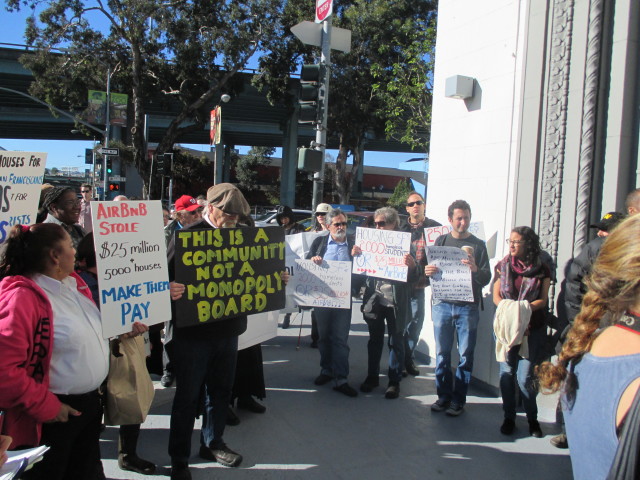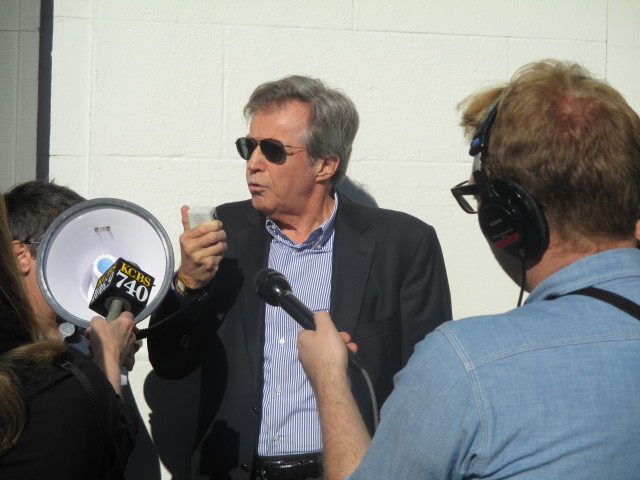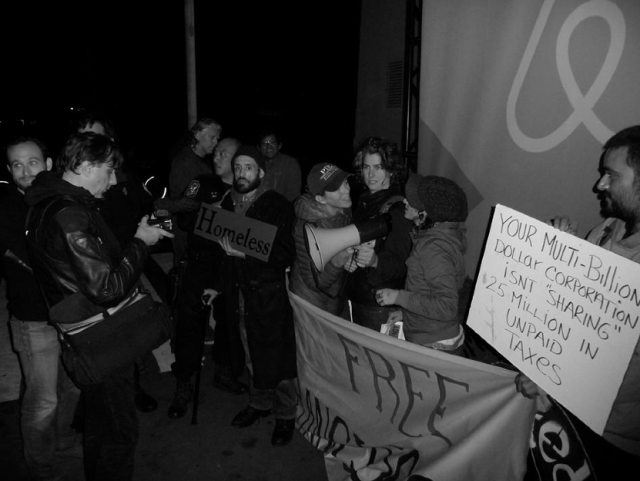
by Tim Redmond with Manissa Maharawal and Erin McElroy
NOVEMBER 25, 2014 – Former Sup. Aaron Peskin, standing in front of the headquarters of Airbnb yesterday, explained why the company and its local business plan has a serious problem.
San Francisco,” he said, “gets this.”
The rally to kick off a new initiative drive and to demand that the company pay its back taxes brought together the unlikely coalition that is going to create one of the defining issues of the 2015 mayoral race.
Speakers included Sara Shortt from the Housing Rights Committee and Charles Goss of that Apartment Owners Association. Former Planning Commission President Doug Engmann was there, as was Roger Ritter of the West of Twin Peaks Neighborhood Council.
Union leaders from the hotel workers, teachers, and community college unions were there.
Engmann explained that critics of unregulated short-term rentals had drafted an initiative in the spring and collected more than 17,000 signatures. They held off filing the measure in the hope that the supervisors would address the issues — but now they will head back to the ballot:
“The legislation made everything worse,” he said. “It’s impossible to tell what is a legal or not legal unit.”
Since 2012, he said, the city’s tax collector has ruled that Airbnb and its hosts have to pay the city’s hotel tax, but only in the past month has the company actually started to pay.
“You can’t decide when you pay your taxes and when you don’t,” he said. “You pay your taxes when they’re due.”
The money Airbnb hasn’t paid – an estimated $25 million – would pay for 125 new ambulances, 200 more police officers, 250 nurses, or 31 new Muni buses. That’s money that a giant multibillion corporation has simply decided it doesn’t have to pay – and so far, the city hasn’t forced the issue.
Theresa Flandrich, a North Beach resident who has seen 14 apartments on her street turned into hotel rooms, said that “Airbnb is a unifying force” – it’s brought together so many groups that often don’t work on the same issues.
Even Sen. Dianne Feinstein – hardly a radical housing activist – has spoken out against Chiu’s Airbnb bill.

Engmann told me that work is starting on drafting a new measure for the November 2015 ballot that will set much tighter rules on the conversion of rental housing and private homes to hotel rooms for tourists. Among other things, the coalition wants to mandate that Airbnb and other hosting platforms share with the city the data that will allow effective enforcement.
The group also wants some reasonable zoning rules to determine, with input from the neighborhoods, where hotel uses are acceptable – and how many can be set up in any one area.
It’s likely that the measure will also mandate that the company pay all taxes that it owes back to 2012.
Mayor Ed Lee is a huge fan of the so-called Sharing Economy (although it’s not sharing; it’s commerce). There’s a good chance that any serious challenger will side with the new initiative campaign – and find broad-based support there.

This was the second demonstration in three days — on Saturday November 22, members of Eviction Free San Francisco and the Anti-Eviction Mapping Project paid a visit to Airbnb’s inaugural Airbnb Open conference at Fort Mason. The protest coincided with Airbnb’s awarding of its first “Community Award” – a bit ironic in the climate of an eviction crisis that Airbnb and other vacation rental corporations helped create. As one protester’s sign read, “This is a Community, Not a Monopoly Board.”
Protesters dropped an “Eviction Free San Francisco” banner in front of the large, eerily lit Airbnb Open sign, and managed to sing and read from a letter — before Airbnb conference organizers turned the lights out around the protesters and called the police.
As the Anti-Eviction Mapping Project recently reported, there are numerous hosts throughout the city displacing tenants for tourists and contributing to a lack of affordable permanent housing, and sometimes increased evictions.
Police arrived in three cars and escorted the protestors to a caged “Free Speech Zone,” which the protestors refused to enter.
AirBnb has shrugged off criticism by housing activists far and wide, as well as investigations by the New York attorney general, whose office released a report in October 2014 that found over three quarters of the rentals in the city are in violation of the city’s housing and zoning ordinances. The report also found that more than a third of the units rented and revenue generated in New York is from commercial operators.
AirBnb rarely talks about these commercial operators, and instead focuses its marketing and public image on the quaint stories of individual hosts opening up their homes to guests. Executive “hospitality guru” Chip Conley was recently quoted as saying that his dream for the company, which is in essence a multi-billion dollar middleman that facilitates people selling space in their homes, is for it to win the Nobel Peace Prize for their role in fostering cross-cultural understanding worldwide.
This fantastical claim is not just the delusional dream of an ambitious CEO but represents a concerted effort on the part of AirBnb to maintain an image that ignores the harm that the company causes. Also often not mentioned by the company — and in fact furiously refuted — are the findings of a 2014 Harvard Business School report that found that black hosts have to charge 12% less than white hosts for rental spaces of the same general quality and in the same general area.




